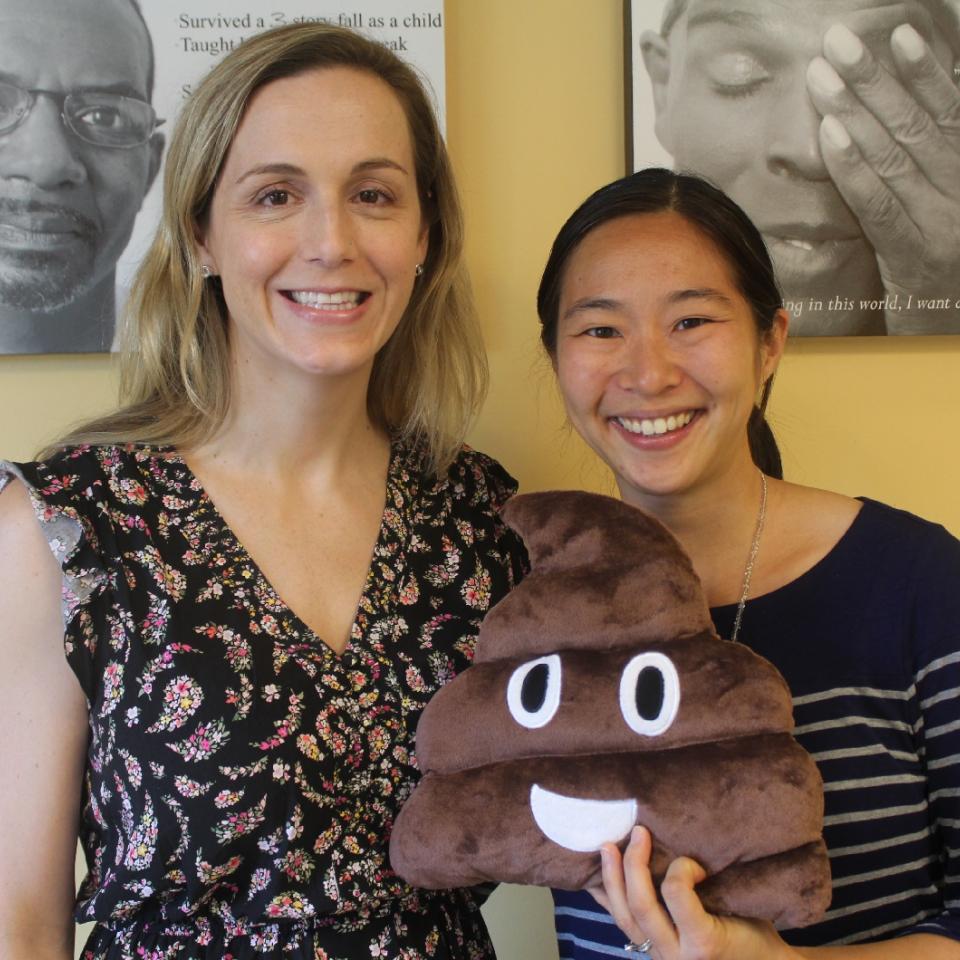An artist, gamer, and movie lover, Curtis McLaughlin (above) has been part of the Health Care for the Homeless Art Group for more than five years.
Art is one of my coping skills. I can be anywhere and create art wherever I go.


10.16.18
“My husband calls me the ‘poop nurse,’” says Tracy Russell with a chuckle.
And for good reason. Tracy and fellow Population Health Nurse Catherine Fowler have been on a mission to increase colorectal cancer screenings and timely follow-up care among our clients.
Thanks to their support, we have reached our goal of screening 50% of our eligible medical clients for colorectal cancer!
“If you’re fighting for a place to live, fighting for a place to eat, a proactive screening isn’t going to be on the top of your list,” says Tracy. “And how are you going to get there? Where are going to stay to prepare? Who is going to escort you afterwards? Our goal is to make that process a lot easier.”
Colorectal cancer is the 3rd leading cause of cancer-related deaths in the U.S. Like most cancers, it can be treated if caught early enough.
Under our 2018 strategic initiatives, we prioritized screenings and treatment for serious conditions like colorectal cancer. Tracy and Catherine help staff members find and treat clients with these conditions. They helped create an alert system within the electronic health record so that nurses, doctors and certified medical assistants know when a client’s cancer screening is overdue. They have also compiled easy-to-read educational materials to assist providers with helping clients manage their conditions.
Tracy and Catherine are big on lists (also known as registries). They regularly pull lists of clients overdue for a screening or whose tests came back abnormal. Then, they share those lists with medical providers who get clients the care they need.
Recently Alex* ended up on one of those lists. They are a longtime client with chronic health conditions including heart failure and high blood pressure. Tracy and Catherine shared the list with their care team, who, without missing a beat, got Alex a colonoscopy. Within a few weeks, Alex got their test results back and could breathe a sigh of relief—they didn’t have cancer.
Alex was lucky, but not all clients are. Some test positive. Tracy and Catherine have intervention plans for when that happens, too. “If someone has an abnormal cancer screening, we work with their care team to get them into diagnostic care and treatment right away,” says Catherine. “That’s the whole reason we are doing these screenings in the first place—to find and treat people for serious diseases.”
Tracy and Catherine say mapping out big interventions like that is key, but so are simple incentives to get people screened in the first place. For instance, using testing kits that clients can mail-in or giving out Subway gift cards to clients who get a screening. Right now, Tracy and Catherine are working on a bowel prep care package to ease the burden of preparing for a colonoscopy. It’ll include things like a water bottle, breakfast bar and instructions.
*Alex is not the client's real name.
Have resources on health topics you’d like to share with staff and clients? Email Tracy Russell or Catherine Fowler.
An artist, gamer, and movie lover, Curtis McLaughlin (above) has been part of the Health Care for the Homeless Art Group for more than five years.
Art is one of my coping skills. I can be anywhere and create art wherever I go.
Client storytelling is a staple of the nonprofit business model, ever present in advocacy, clinic tours, fundraising—and news articles like the one you are reading right now.
The Trans Rights Advocacy Coalition (TRAC) has been the driving force in championing trans rights policy changes in Maryland. Due to stigma and structural discrimination, transgender people—particularly transgender people of color—experience high rates of homelessness. Following the implementation of the Trans Health Equity Act in January, we talked with TRAC leadership about their work and community.
Since starting in January 2022, REI Health Specialist Arie Hayre-Somuah, LMSW, MPH has worked with our clinical teams to identify health disparities and move us closer to health equity. This year, she is turning her focus to the topic of health literacy.